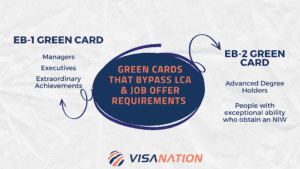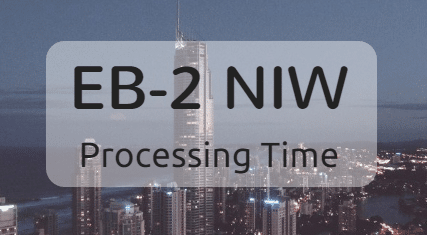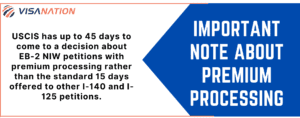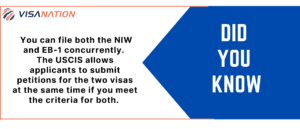Continuous Engagement National Interest Waiver Proof
Obtaining an employment-based green card can be a long and intensive process that usually requires job offers, labor certifications, petitions, and long waiting periods. Each different preference level has its own benefits as well as its disadvantages. Fortunately, there are two types of green cards that circumvent both the labor certification and job offer requirements by allowing you to self-petition.
- EB-1 green card for managers, executives, and people with extraordinary achievements.
- EB-2 green card for advanced degree holders and people with exceptional ability who obtain an NIW.
The sometimes burdensome PERM Labor Certification process can be avoided by EB-2 petitioners by establishing that the foreign national should be granted a "national interest waiver." The National Interest Waiver (NIW) allows a foreign national to "self-petition," and file an I-140 on behalf of himself/herself without the involvement of an employer and a labor certification application.
For almost two decades, the Matter of New York State Department of Transportation (NYSDOT) severely limited the availability of the national interest waivers. This case established a three-prong approach for determining whether a foreign national is eligible for a national interest waiver.
However, on December 27th, 2016, the Administrative Appeals Office (AAO) revised the three-prong approach to be more inclusive for a broader range of potential scenarios . The decision was called Matter of Dhanasar .

EB-2 National Interest Waiver Requirements (AAO):
The first NIW requirement is that the alien must show that his/her proposed endeavor is considered to have substantial merit and national importance. This merit can be shown in areas like business, science, technology, health, culture, or education. There does not need to be quantifiable evidence of economic impact, though it may help your case.
One must keep in mind that meeting this requirement does not create a blanket approval for the field of endeavor and the US government shall review applications on a case-by-case basis.
The second NIW requirement is that the foreign national must be in a position to advance the proposed endeavor. This means that the AAO will look at factors such as the alien's educational background, experience, relevant skills, a record of similar successes, current progress, and having a plan for success.
Petitioners will not be required to prove that their endeavor will succeed, but rather that they are equipped to make it succeed if the opportunity arises.
The final NIW requirement is that the applicant must present evidence that the U.S. would benefit on balance to waive the job offer criteria for an EB-2. "On balance" simply means that the advantages of waiving the job offer requirement outweigh the advantages of not waiving it.
EB-2 NIW Green Card Processing Time
The NIW green card processing time is typically between 3 to 9 months. Though, this time greatly depends on the assigned USCIS Service Center and the adjudicating officer. Processing times vary as USCIS evaluates each application and
 supporting evidence on a case-by-case basis. It's best to consult an NIW green card lawyer who can give you a full breakdown of your case.
supporting evidence on a case-by-case basis. It's best to consult an NIW green card lawyer who can give you a full breakdown of your case.
EB-2 NIW Premium Processing 2022 Update
Up until recently, applying for a National Interest Waiver for the EB-2 meant that you were unable to take advantage of premium processing. With premium processing, you can pay an additional fee to have your visa or green card processing time expedited to just 15 calendar days. It does not increase your chances of approval, but it could save you months of time waiting for a decision.
However, while premium processing was available for many of the other employment-based green card categories, including the standard EB-2, it was not an option for those applying for the EB-1C or the EB-2 NIW. This meant that there was no way to speed up the processing time for this category.
That being said, USCIS has recently made substantial changes to the availability of premium processing. In an announcement made on May 24, 2022, USCIS stated that beginning July 1, 2022, current applicants for both the EB-1C and the EB-2 NIW will be able to take advantage of premium processing if they so choose. Petitioners can now file an I-907 to expedite the adjudication process.
However, there are a few caveats to this extension. The first is that this is only available for those that currently have a pending I-140 petition. USCIS is not accepting new premium processing petitions as of the announcement. The second is that USCIS has 45 days to make a decision for petitions with premium processing.

Important Update: USCIS has also published a new I-907 form that must be used starting on July 1, 2022. If you file the old I-907 version after that date, it will be rejected.
National Interest Waiver Criteria for Physicians
For those physicians seeking an EB-2 visa, they must demonstrate that they'll be working in an underserved area or at a hospital dedicated to the Veterans Administration (VA) within the U.S. for five years. These physicians will need to provide supporting evidence that their services will meet the minimum criteria.
EB-2 National Interest Waiver Documents Checklist
As a recap, here's a list of the document required:
- Form I-140
- Form ETA-750B
- Evidence supporting that the applicant has an advanced degree or exceptional ability
- Petition letter drafted by EB-2 NIW green card lawyer
- Letters of recommendation (see below)
- Affidavits from leaders in your field
- Evidence of past achievements, mentions, or recognition
- Documentation showing that a labor certification would adversely affect the national interest
- Proof of 2+ years of experience in the area
- An updated resume
- Evidence of memberships, publication citations, conferences, or other articles
You will need to file all of these documents concurrently with your petition in order to be considered eligible for the NIW green card. If your petition and ETA-750B are approved, you will be able to move on to the next step, but only if your priority date is current.
Despite successfully obtaining a National Interest Waiver, you will still need to wait until your priority date is current. The priority date is the day that the USCIS receives your I-140 petition. You will need to check the monthly visa bulletin released by the Department of State to see if your priority date matches up with the final action date given in the EB-2 category for your country of origin. For some countries, the priority date takes several years to become current, but for others, it can be no time at all.
Once your date is current, you can either adjust your status if you are in the U.S. under a valid nonimmigrant status, or you can go through consular processing if you don't have a valid status. Adjusting your status simply requires filing an I-485 form and waiting for approval. Consular processing involves making an appointment with a U.S. Consulate or Embassy in your home country and participating in a one-on-one interview with a consular officer. In either case, after approval, you will have your NIW green card!
Letters of Recommendation
Letters of recommendation or support letters help to reinforce your NIW case if they can demonstrate national interest and can also show that you have had an impact within your respective field which highlights your work's benefits. These letters can be from high-level managers, former employers and colleagues, or anyone else familiar with the benefits of your work.
However, it is important to note that the USCIS will place different weight on letters of recommendation depending on who wrote them. For example, letters from peers and colleagues will hold less weight than letters written by esteemed contemporaries that did not have a hand in your work.
As it stands, there is no minimum nor a maximum number of recommendation letters that are required. If you do choose to include them, they should be placed underneath Form I-140 in your package. Once received, USCIS will examine these letters of recommendation in addition to the credentials of their writers.
Accompanying these letters should be a list of the individuals who wrote the letters as well as their titles and employers.
How to Prove That You Have Exceptional Ability
To put the NIW into perspective, we need to understand the purpose of the PERM Labor Certification. The PERM is designed to protect American jobs and mitigate the amount of job outsourcing that takes place. This is why U.S. employers need to offer the prevailing wage and determine that no qualified U.S. workers are available to take the position.
Your endeavor must be beneficial enough to warrant waving this protective policy. In essence, this is what the regulations mean when they say that the U.S. must benefit "in the balance". The positive impact of your endeavor must outweigh the benefits of the PERM.
If you do not possess an advanced degree or its equivalent, then you will need to provide evidence that you possess exceptional ability in order to qualify for your EB-2. Here are some items that qualify:
- Letters from past or current employers proving that you have a minimum of ten years of experience working in your field full-time.
- Licensing or certification that enables you to practice your trade.
- Evidence of having an exceptional salary that relates to your ability.
- Maintaining membership in an association of professionals that requires an exceptional ability for membership.
It is important to note that this list is not exhaustive and there may be many items that could serve to prove your exceptional ability. If you believe that you qualify, but do not see your evidence listed here, be sure to retain the services of an immigration attorney to learn if your evidence fulfills the requirements.
EB-2 NIW Cost and Filing Fees
The filing fees for the EB-2 NIW are as follows:
- I-140 Immigrant Petition for Alien Worker: $700
- I-485, Application to Register Permanent Residence or Adjust Status: $1,140
- Biometric fee: $85 (if applicable)
- DS-260 filing fee: $230 (if you are filing from outside the United States)
- Premium processing fee (optional): $2,500
- Keep in mind that this is only available to those with I-140 petitions that were being processed as of July 1, 2022
- Legal fee (optional): You should also factor in the legal fee if you are hiring an immigration attorney, which is very important. This is negotiable between you and your attorney.
What If My NIW Is Denied?
Like anything else in immigration law, there is always the possibility that your petition will not be approved. If you've experienced an NIW denial or are looking to avoid it, here are some common reasons:
- Filing too much evidence – if you bog your case down with excessive documents, your evaluating officer will likely miss the more important evidence.
- Not advocating your case well – remember that it's not enough to simply state your qualifications. You also need to argue them in a way that makes you eligible according to the regulations.
- Poor reference letters – make sure that your letters of recommendation are experts and can back up their information with facts about your work.
If your NIW was denied, you can choose to make a legal motion to reopen or reconsider your case, you can appeal to a third party (the Administrative Appeals Office), or you can consult your immigration attorney to see if there is another green card option available to you. In any case, you don't want to take any legal action against the evaluating officer without an attorney to guide you.
The legal motions of reopening or reconsidering are essential appeals to the evaluating officer. In a motion to reopen, you are asking the officer to take a second look at your case in light of new evidence that has come to light. For a motion to reconsider, you are demonstrating that the evaluating officer was incorrect in his or her decision to deny your NIW green card case. It is important to note that these are delicate legal procedures and should not be attempted without the help of an immigration attorney.
NIW vs PERM
If you are wondering whether you should take the NIW or PERM path to a green card , or if you are just wondering what the difference between these two documents is, then let's go over them.
The PERM Labor Certification is a process put in place by the Department of Labor with the intention of protecting the jobs of current U.S. workers. It serves to help prevent employers from hiring large numbers of green card holders and replacing their workforce with less expensive labor.
To get a PERM, an employer needs to place a job order with the state and also advertise for the position through several different channels for at least 30 days. The employer also needs to interview any potential applicants and give a reason for denying each one. Only if no qualified candidates apply can the PERM be obtained, allowing the beneficiary to obtain a green card.
The PERM is required for all EB-3 petitions and most EB-2 petitions. The only way to avoid this requirement for the EB-2 is through the National Interest Waiver.
The advantages of the PERM are that you can obtain an EB-3 with one and you do not have to prove that your work is in the national interest in order to qualify. Your employer simply needs to show that no other U.S. candidates were eligible for the position. However, the disadvantages of the PERM are that you must have a sponsoring employer and a full-time job offer. Also, the DOL may choose to audit the PERM or enact supervised recruitment, which can slow the process down for nine months or more.
The advantages of the NIW are that, by going through the NIW process, the PERM process is waived. You can self-petition and you do not have to have a job offer. However, NIW cases are subjected to a higher level of scrutiny than many other green card categories.
NIW Green Card FAQs
Take a look at some of the most frequently asked questions VisaNation NIW green card lawyers receive during consultations and other inquiries.
Q. What is the difference between a regular EB-2 and EB-2 NIW green card petitions?
The difference is that you need an employer to sponsor a regular EB-2 visa while you can sponsor your EB-2 NIW yourself. The employer will also need to obtain a labor certification before submitting an I-140 petition on your behalf. On the other hand, an NIW allows you to file your I-140 directly to the USCIS.
Q. Are labor certifications necessary for NIW cases?
PERM Labor Certifications are not required for those categorized as beneficial to the national interest although they are required for other EB-2 beneficiaries. Based on our experience, a letter accompanied by the NIW from the interested sponsor can have a beneficial effect on the visa case.
Q. What is usually considered an advanced degree?
The terms outlining an advanced degree (as characterized by USCIS) include a United States master's degree or higher, or a foreign equivalent degree.
Q. What if I only have a bachelor's degree?
Bachelor's degrees are also considered the equivalent to a master's when the individual has five years of progressive experience to add. The experience must be in the specialty or field you are applying for.
Q. Do I have to possess both an advanced degree and exceptional ability to qualify for an NIW?
No, you only need to meet the requirements for one of the two criteria. Though it will be advantageous to meet the USCIS definitions of the two National Interest Waiver requirements, it is not compulsory. With either of the two and a convincing petition, prepared by an experienced EB-2 immigration lawyer, you should be good to go.
Q. I haven't published any articles in journals in my field. Can I still apply for EB-2 NIW?
Yes, you can still apply for an NIW even if you don't have any published work. The published article requirement is just one out of the many criteria given by the USCIS. If you have the academic qualification and/or years of industry experience stipulated for NIW, you may still qualify without the evidence of a published article.
The same applies to the "Awards and Professional Membership" criteria. It is not mandatory to have all these before you can qualify. In fact, the USCIS allows those with " comparable evidence of eligibility" that are not exactly as listed on the website to file an NIW petition. The most important thing is how compelling the petition is.
Q. Must I live in the U.S. to apply for an NIW?
You are not required to be residing in the U.S. to apply for an NIW. However, if you are not in the U.S. when you petition for your EB-2, you will not be able to adjust your status to that of a legal permanent resident. Instead, you will need to go through consular processing for your green card.
Q. Is there a minimum number of letters of recommendation needed?
While there is no minimum number required, the more evidence you submit that demonstrates qualification, the stronger your case will be.
Q. Am I allowed to apply for an NIW if I have a pending labor certification with the DOL?
Yes, you may still apply for NIW even if you have a labor certification pending. The PERM labor certification and the NIW are handled by two different organizations. While your labor certification is filed with the DOL, the agency that will process your NIW is the USCIS. So, one does not stop the other. In fact, it is another way for boosting your chances for approval, in that if your labor certification is denied, you will still have the hope of possibly getting the NIW petition approved.
Q. Can I apply for an NIW if I was denied a labor certification?
Assuming you meet the qualifications for an NIW, your previous denial should not have an impact on the outcome. There are several reasons for your PERM to be denied, including there simply being a qualified U.S. worker available to take your employer's position. Cases such as these should not be detrimental to your NIW case.
Q. Do I need a job offer to be eligible for an NIW?
Because the NIW is a way to circumvent the job offer requirement, you do not need one in order to apply.
Q. Do I need to have an advanced degree to apply for an NIW?
While it is not a strict requirement to have an advanced degree for an NIW, having one can go a long way in helping your EB-2 NIW case. In place of an advanced degree, a bachelor's degree with five years of relevant experience in your field may also suffice. In the absence of either of these, you will need to demonstrate that you have exceptional ability in order to qualify for the EB-2 green card.
Q. What is the EB-2 NIW Processing Time?
You can generally expect NIW processing time for the USCIS to adjudicate applications to take anywhere between 3 and 9 months. Although there is always the possibility that it could take longer if you are issued a Request for Evidence (RFE). If you receive an RFE, it is important that you take it to an immigration attorney for help with your prompt response. For an official resource detailing the USCIS NIW processing time, you can visit their website on AAO processing times .
Q. What is EB-2 NIW RFE?
Requests for additional evidence (RFE) are issued by the USCIS, requesting more information from a visa applicant. It is usually issued when the USCIS is not convinced that an NIW applicant meets the criteria needed to prove that he or she is qualified for the visa. This should not be mistaken for denial or rejection.
The recipient of an RFE will only be required to provide some items that appear to be missing in his or her petition. If you receive an RFE, you will be given a timeframe within which the requested information must be provided. It is always best to consult an immigration lawyer to help look into the details of the request and guide you on how to answer it. An RFE must be handled with care as there will be no second chance.
Q. Is an EB-2 NIW the only avenue for getting an employment-based green card without a labor certification?
No, there is also the EB-1, known as the first preference employment-based green card . Just like the EB-2 NIW, EB-1 applicants also do not need a labor certification. Also, if you also qualify for the extraordinary ability subcategory of the visa, you will not need a job offer or employer and you can self-sponsor your petition.
Q. Which should I go for between the EB-1 and the NIW?
The answer will depend on which green card you qualify for the most. Note that the two categories are completely different visas. Each has its own peculiarities. It must also be noted that the overall approval rate for the EB-1 appears to be lower. This perhaps is the reason why many people choose an NIW over EB-1 even when they have the credentials that may qualify for both.

But if you are still not sure which to settle for, you can file both the NIW and EB-1 concurrently. The USCIS allows applicants to submit petitions for the two visas at the same time if you meet the criteria for both. This will actually be an opportunity to improve the likelihood of getting an approval from at least one of the two categories. As a matter of fact, it is possible to receive approvals from the two petitions. But then, you should weigh your options clearly and make an informed decision.
How VisaNation Law Group Lawyers Can Help
It should be noted that although the National Interest Waiver requirements are seemingly easily met based on the case law, attention to detail and the ultimate issues of qualifying for the national interest waiver should not be assumed simply because the USCIS has allowed a certain profession to qualify for NIW easily in the past.
VisaNation Law Group NIW green card lawyers can assist clients in determining whether they are eligible based on the criteria listed above. They can also help you find evidence that could be used to prove your exceptional ability and your endeavor's positive impact on the U.S. economy.
Their veteran attorneys have significant experience with complex employment immigration cases and are prepared to assist you with any complexities that may arise with your NIW case. If you would like to speak with one of the experts, feel free to fill out this simple contact form to schedule your comprehensive consultation.
-
- EB-2 Green Card
- EB-2 NIW Frequently Asked Questions
- NIW for Physicians and Doctors in Underserved Areas
- Changing Jobs After NIW Approval
- NIW vs PERM Labor Certification
- NIW RFE
batesonperclovery.blogspot.com
Source: https://www.immi-usa.com/eb2-green-card/niw/
0 Response to "Continuous Engagement National Interest Waiver Proof"
Post a Comment